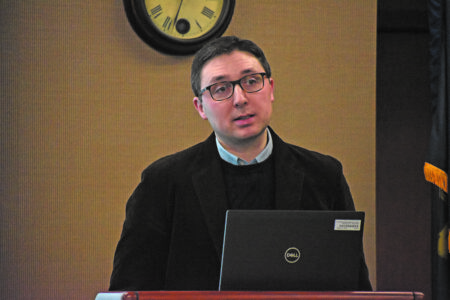Some argue pay-to-stay is wrong

Gazette file photo While many claim inmates should be made to pay for their incarceration and fees, critics argue excessive fees and fines are beyond many to repay.
HOUGHTON — Michigan Public Act 118 of 1984 states in part that counties may seek reimbursement for “any expenses incurred by the county in relation to a charge for which a person was sentenced to a county jail.” In many counties across the state, the burden of expenses is being placed entirely upon the inmate. Fees can be charged for every aspect of incarceration, according to the law.
Michigan is one of 41 states in which inmates can be charged room and board for jail and prison stays, stated Joseph Shapiro in his May 19, 2014. National Public Radio’s All Things Considered report, “As Costs Rise, the Poor are paying the price.” In addition to room and board, inmates are also charged for being booked into jail. While booking costs vary from county to county, Houghton County Sheriff Brian McLean said at his jail, the fee is set at $12.
While some people agree with the law, saying the offender should bear his own burden for his crime, critics claim it places an unfair burden on inmates who are often disadvantaged, and do not possess the means of ever re-paying the debts.
“It’s a practice that causes the poor to face harsher treatment than others who commit identical crimes and can afford to pay,” Shapiro said in his investigative report. “They tend to be high school dropouts, they tend to be people with mental illness, with substance abuse. So these are already very poor and marginalized people in our society, and then we impose these fiscal penalties to them and expect that they make regular payments, when in fact the vast majority are unable to do so.”
Lauren-Brooke Eisen, senior counsel for the Brennan Center for Justice, a New York-based nonpartisan policy institute, agrees.
“The country’s criminal justice costs –mostly policing, jails, prisons, and courts — rose from $35 billion in 1982 to more than $265 billion in 2012 — a growth of over 650 percent. With this dramatic growth, those caught in this net are burdened with additional fees, many of which are charged simply for being in the criminal justice system,” Eisen wrote in her 2015 report, “Charging Inmates Perpetuates Mass Incarceration.”
Eisen argued that once inmates leave a jail, accumulated debts created a prolonged involvement with the justice system.
“Chasing down formerly incarcerated people, the majority of whom are poor, to collect these debts is often ineffective,” Eisen stated. “These collection efforts often cost more than jurisdictions recoup in revenue.”
McLean said in Houghton County, former inmate accounts are considered delinquent if they show no activity in three to six months, and are referred to a collection agency. McLean said in that event, the county receives approximately 30 percent of the total owed.






